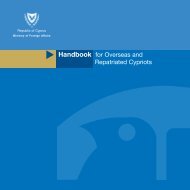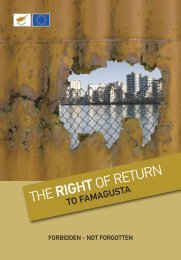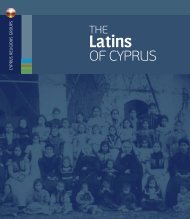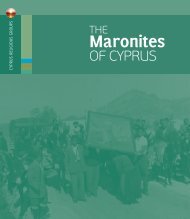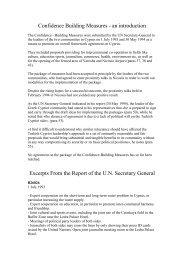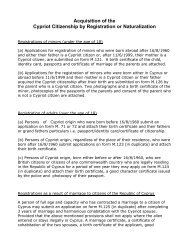Myra Xenides- Arestis v. Turkey
Myra Xenides- Arestis v. Turkey
Myra Xenides- Arestis v. Turkey
You also want an ePaper? Increase the reach of your titles
YUMPU automatically turns print PDFs into web optimized ePapers that Google loves.
38 XENIDES-ARESTIS v. TURKEY DECISIONArticle 1 Protocol No. 1, cannot properly be interpreted as limiting orderogating from the obligations imposed by the Hague Regulations. It iscontrary to the relevant rules of international law for <strong>Turkey</strong> to depriveindividuals, under any circumstances, of any immovable property innorthern Cyprus, the area occupied by her troops. In this connection, theCypriot Government refer to the Hague Regulations and GenevaConvention IV.The Cypriot Government contend that the procedure for determination ofthe applicant's rights under the Law as well as the commission do not satisfythe fair trial guarantees provided for under Article 6 of the Convention.Firstly, there is restricted access to the commission in view of the time limitprescribed for the submission of applications. No grounds for the exerciseof the “TRNC Government's” discretion to extend this time limit are set outin the Law. Secondly, it is unclear who will be the respondent in claimsbefore the commission. Thirdly, the commission does not comply with therequirements of independence, impartiality and “established by Law”. Inthis connection, the criteria set out in the Law concerning the appointmentprocedure of the commission's members as well as their qualifications aretoo vague to satisfy the requirements of legal certainty. The Law lacksadequate and effective safeguards against the abuse of discretion and doesnot include any specific mechanisms whereby external pressures oncommission members will be prevented or reduced. The CypriotGovernment observe that the “TRNC executive” has significant control overthe establishment, organisation and functioning of the commission. In thisrespect, they claim that the Law contains no adequate checks and balancesfor monitoring the control of the executive and guaranteeing against sucharbitrariness. Consequently, they argue that there is a strong and legitimateconcern that the commission will be partial to the “TRNC” executive andtherefore to the respondent Government.According to the Cypriot Government, the commission members lack therequired independence and impartiality to determine the applicant'sConvention rights. In particular they underline the fact that the majority ofits members have personal or family interests in Greek-Cypriot properties innorthern Cyprus. In particular they allege that six out of the seven membersof the Commission and/or members of their family are living in housesowned or built on properties owned by Greek Cypriots. The CypriotGovernment support their arguments with documentation that include, interalia, details from “TRNC” telephone directories, title deeds, maps andphotographs. In this connection, they have requested the TurkishGovernment to clarify its position by providing full information andsupporting documents about any Greek-Cypriot properties owner, occupiedor disposed of by each member of the commission and their family since1974 as well as the former or present links between members of thecommission and the “TRNC” regime. They state that since the books and










